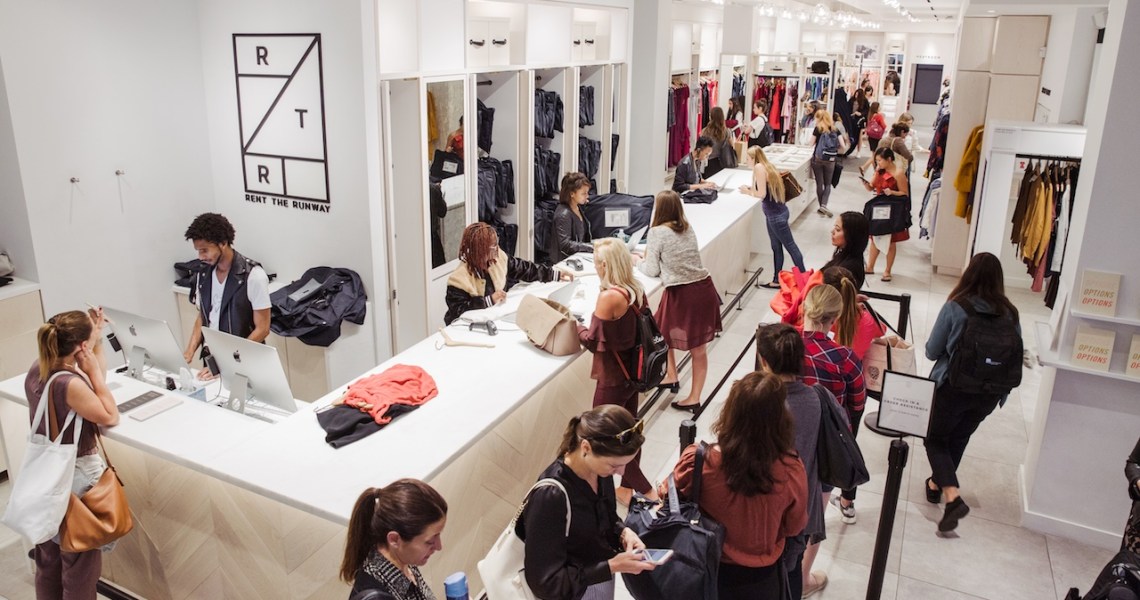When Rent the Runway launched an Unlimited rental model in 2016, seven years after the company was founded, it helped rocket the company to success. Now, amid pressures from the pandemic, the company is discontinuing unlimited rentals, switching to a three-tiered model.
Instead of an Unlimited plan, customers can opt into four items a month, eight items a month or 16 items a month, priced at a monthly $89, $135 and $199, respectively. The Unlimited model was $159 per month. No new Unlimited memberships can be purchased starting next week, and current users can use Unlimited until the beginning of next year, at which time they will be asked to switch.
Unlimited served an important iconic purpose. In a previous interview with Glossy, chief merchant Sarah Tam said the appeal of Unlimited was a driving factor in the company’s early growth.
“The growth of Unlimited was viral in the beginning,” Tam said in February. “It got customers interested and, to be honest, it got the brands interested as well. It’s what helped us grow from making these small orders from brands to making orders that are larger than a lot of retailers are. And that interest from brands led to our current model, where we do a lot of revenue sharing with more than 200 brands, which is good for both of us.”
It’s a move that was a long time coming, and CEO Jennifer Hyman told CNBC the team had been discussing the move for 18 months, long before the pandemic began. But since then, Rent the Runway has been hit hard. The entire model was built on the idea of customers renting expensive clothes for an evening out like a wedding or a gala. It then evolved to customers using Rent the Runway as a way to expand and rotate their closet, often having clothes shipped to their offices and exchanging clothes frequently.
The pandemic has put events on ice and the move to work-from-home has eliminated much of the need for fresh outfits day after day. Within weeks, customers began to cancel or pause their memberships, in turn. In response, the company laid off its entire retail team and cut costs by 51%. Last year, it was valued at more than $1 billion, but that valuation has reportedly dropped to $750,000 since then.
In her explanation, Hyman said that phasing out the Unlimited plan is meant to help the company stabilize its revenue stream. An Unlimited rental model is inherently cost-draining, especially due to the required shipping and laundering involved. The logistics of Unlimited are also complicated — so much so that the company shut down its service temporarily in October because it was becoming too overloaded with shipments to keep up with demand.
Ad position: web_incontent_pos1
Rent the Runway wants to position this change as less of a big deal than it might seem. And in some ways, it isn’t. According to data from Rent the Runway, 70% of Unlimited members were renting less than 8 pieces per month. Assuming they keep their same habits, those users are actually getting a rate that’s $25 cheaper. Only 6% of users ever rented more than 16 items, meaning the amount of people who are looking at a price increase for their same behavior is, relatively, small.
Notably, none of the other major rental companies like Nuuly offer an Unlimited option. Le Tote had one for years, phased it out two years ago, then brought it back earlier this year. But the company went bankrupt in August and the future status of its Unlimited plan is unclear.
Rent the Runway is pitching the shift away from Unlimited across rental as something that was both inevitable and ultimately good for both the company and customers, even if customers are already lamenting its loss.
“Our new membership structure brings our community’s most requested features to life — including customization, flexibility, and increased focus on sustainability — and will have most of our customers paying less for their memberships while receiving the same or more items per month,” Hyman said in an emailed statement to Glossy. “We’re committed to investing in a seamless experience that we believe is better for our customers, our business, the rapidly shifting retail landscape and the world we share.”




